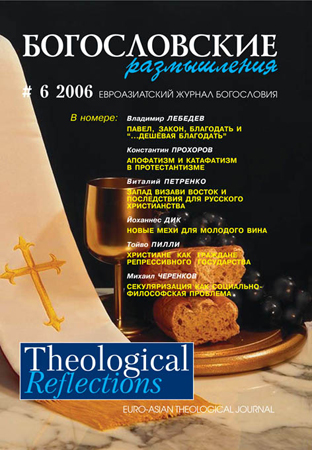Secularization as a Social-Philosophical Problem
Keywords:
Secularization, secularists and fundamentalists, democracy is based on Christian foundations and is doomed to self-destruction by secularization, secularization could lead to new forms of totalitarianism, including the establishment of theocratic regimesAbstract
Secularization is of concern not only to theologians; the crisis has captured the interest of social and political philosophers. If Western theologians and advocates of liberal democracy remain optimistic and are attempting to rethink Christian proclamation and find adequate solutions to the challenges of a godless world, then Orthodox theologians and representatives of conservative thought are more pessimistic and see the only solution in a return to the ideals of the past. Democracy is based on Christian foundations and is doomed to self-destruction by secularization. Several consequences of secularization can be predicted. The introduction of secular ideas into social practice could lead to Christianity’s dissolution into religious pluralism and the loss of its status as the “center” of European culture and civilization. The realm of religion could be reduced to the merely social, finding its expression in civil religion (as in the USA). The opposition of secularists and fundamentalists could be accompanied by the escalation of tension, expressing itself in a “conflict of civilizations” on religious grounds. A conservative revolution as a radical means of halting secularization could lead to new forms of totalitarianism, including the establishment of theocratic regimesReferences
- Батай Ж. Теория религии. – Минск: Современный литератор, 2000. – 352 с.
- Бультман Р. Избранное: Вера и понимание. Т. 1-2. – М.: РОССПЭН, 2004. – 752 с.
- Ваторопин А.С., Ольховиков К.М. Перспективы секуляризма и религии в эпоху постмодерна // Общественные науки и современность. – 2002. - №2. – С. 136-145.
- Гундяев Н. Святоотеческое богословие и секулярный мир // Православное богословие на пороге третьего тысячелетия. – М.: Синодальная богословская комиссия, 2000. - С. 252-258.
- Джуссани Л. Религиозное чувство. – М.: Христианская Россия, 2000. – 193 с.
- Иоанн Павел II. О культуре // Иоанн Павел II. Мысли о земном. – М.: Новости, 1992. – 424 с.
- Курц П. Искушение потусторонним. – М.: Академический проект, 1999. – 601 с.
- Рормозер Г. Кризис либерализма. – М.: ИФ РАН, 1996. – 289 с.
- Соловьев Э.Ю. Секуляризация - историцизм - марксизм (тема человекобожия и религии прогресса в философской публицистике С.Н. Булгакова) // Вопросы философии. – 2001. - №4. - с. 31-40.
- Тимаков А., Журинская М. О сознании секулярном и церковном // Альфа и Омега. – 2003. - №3. С. 216-246.
- Тэтчер М. Искусство управления государством. Стратегии для меняющегося мира. – М.: Альпина-Паблишер, 2003. – 503 с.
- Фёдоров Н.Ф. О секуляризации как профанации // Фёдоров Н.Ф. Собрание сочинений: В 4-х тт. Т. II. – М.: Прогресс, 1995. - С. 66-67.
- Элиаде М. Очерки сравнительного религиоведения. – М.: Ладомир, 1999. - 488 с.
- Durkheim E. The elementary forms of the religious life. – New York: The Free Press, 1965. – 507 p.
- Rorty R. Solidarity or Objectivity? // Post-Analitic Philosophy /Ed. by Rajchman J. and West C. - NewYork,1985. – pp. 17-38.
Downloads
How to Cite
Issue
Section
License
Copyright (c) 2020 Michael CHERENKOV

This work is licensed under a Creative Commons Attribution-NonCommercial 4.0 International License.
All articles published in the Journal are distributed under a Creative Commons Attribution-NonCommercial 4.0 International License
By submitting an article for publication in Theological Reflections: Eastern European Journal of Theology the author grants the editors the right to publish the article and distribute it in electronic and print form.
The author reserves all copyrights and the right to use the materials of the article in whole or in part for educational purposes, to write his own dissertations, to prepare abstracts, conference reports, oral presentations, etc., as well as post electronic copies of articles (including the final electronic version downloaded from the journal’s official website) on non-commercial web-resources without the consent of the editorial board and founders.



